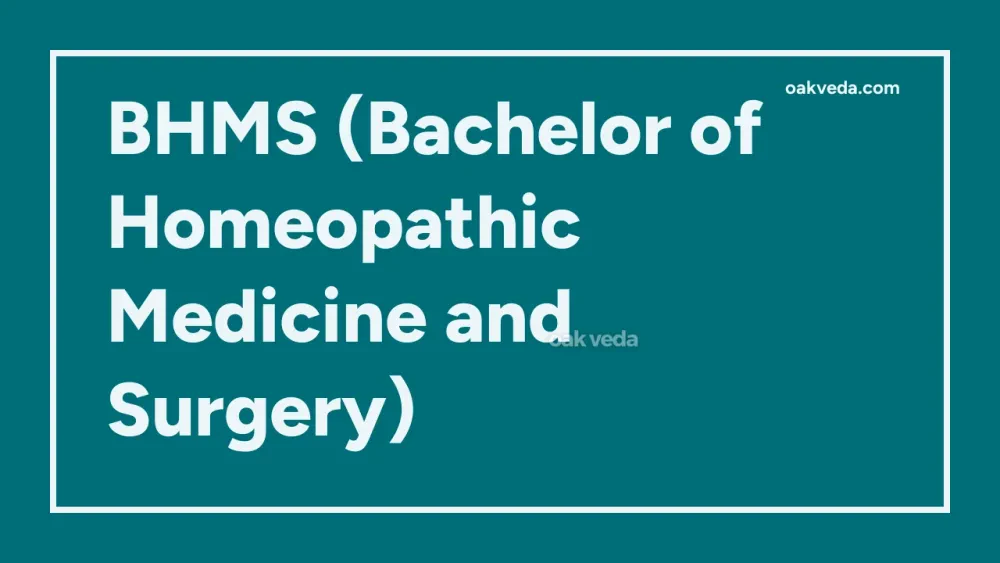
What is the Full Form of BHMS?
BHMS is the abbreviation for Bachelor of Homeopathic Medicine and Surgery. This undergraduate degree program is designed for students who wish to pursue a career in homeopathic medicine, a holistic approach to healthcare that focuses on stimulating the body's natural healing processes.
What is Bachelor of Homeopathic Medicine and Surgery?
Bachelor of Homeopathic Medicine and Surgery is a comprehensive five-and-a-half-year program that equips students with the knowledge and skills necessary to practice homeopathy. The curriculum combines theoretical studies with practical training, covering various aspects of homeopathic medicine, conventional medical sciences, and clinical practice.
Origin and Development of BHMS
The BHMS program has its roots in the principles of homeopathy, developed by Samuel Hahnemann in the late 18th century. As homeopathy gained recognition worldwide, the need for standardized education in this field grew. In India, where homeopathy is widely practiced, the Central Council of Homeopathy (CCH) regulates BHMS education to ensure consistent quality across institutions.
How does the BHMS Program Work?
The BHMS program is structured to provide a thorough understanding of homeopathic principles and practices. Here's an overview of the program:
- Duration: 5.5 years (4.5 years of study + 1 year of internship)
- Curriculum: Covers homeopathic philosophy, materia medica, repertory, and clinical subjects
- Practical Training: Includes laboratory work, case studies, and clinical rotations
- Internship: One-year compulsory internship for hands-on experience
Types of BHMS Programs
While the core BHMS program remains consistent, there are variations in how it's offered:
- Regular Program: Full-time, on-campus study
- Distance Learning: Some institutions offer BHMS through distance education
- Integrated Programs: Combining BHMS with other complementary medicine disciplines
Functions of BHMS Education
The BHMS program serves several important functions:
- Educating future homeopathic practitioners
- Advancing research in homeopathic medicine
- Promoting holistic healthcare approaches
- Preserving and developing traditional medical knowledge
Applications of BHMS
BHMS graduates can apply their knowledge in various healthcare settings:
- Private practice as homeopathic doctors
- Government hospitals and dispensaries
- Research institutions
- Pharmaceutical companies specializing in homeopathic medicines
- Academic institutions as lecturers or researchers
Features of BHMS
Key features of the BHMS program include:
- Comprehensive curriculum covering both homeopathic and conventional medical subjects
- Emphasis on practical training and clinical exposure
- Focus on holistic patient care and individualized treatment
- Integration of traditional knowledge with modern scientific approaches
Benefits of Pursuing BHMS
Choosing to study BHMS offers several advantages:
- Career in alternative medicine with growing global acceptance
- Opportunity to provide side-effect-free treatments
- Holistic approach to patient care
- Diverse career options in healthcare, research, and academia
- Potential for private practice and entrepreneurship
Limitations or Challenges of BHMS
While BHMS offers many opportunities, there are some challenges to consider:
- Limited recognition in some countries where homeopathy is not widely accepted
- Ongoing debates about the scientific basis of homeopathy
- Competition with conventional medicine practitioners
- Need for continuous learning and adaptation to changing healthcare landscapes
Future Developments in BHMS Education
The field of homeopathy and BHMS education continues to evolve:
- Integration of technology in homeopathic practice and education
- Increased focus on evidence-based research in homeopathy
- Collaboration with other medical systems for integrative healthcare
- Expansion of telemedicine and remote consultation techniques
FAQs on BHMS Full Form
What are the eligibility criteria for BHMS?
To be eligible for BHMS, candidates must:
- Have completed 12th grade or equivalent from a recognized board
- Scored a minimum of 50% aggregate in PCB (Physics, Chemistry, Biology)
- Be at least 17 years old at the time of admission
What entrance exams are required for BHMS admission?
Common entrance exams for BHMS include:
- NEET (National Eligibility cum Entrance Test)
- KEAM (Kerala Engineering Architecture Medical)
- PU CET (Panjab University Common Entrance Test)
- AP EAMCET and TS EAMCET (for Andhra Pradesh and Telangana respectively)
Can I pursue BHMS through distance learning?
Yes, some institutions offer BHMS through distance learning. However, it's important to verify the program's accreditation and recognition before enrolling.
What are the career prospects after completing BHMS?
BHMS graduates can work as:
- Homeopathic doctors in private practice or hospitals
- Research associates in pharmaceutical companies
- Lecturers in homeopathic colleges
- Health insurance officers
- Quality control officers in homeopathic medicine production
Is it possible to specialize after BHMS?
Yes, BHMS graduates can pursue post-graduate studies in various specializations such as:
- MD in Homeopathy
- MD in Psychiatry
- MD in Practice of Medicine
- MD in Pediatrics
How does BHMS differ from MBBS?
While both are medical degrees, BHMS focuses on homeopathic medicine, whereas MBBS (Bachelor of Medicine, Bachelor of Surgery) is based on allopathic or conventional medicine. The approach, duration, and curriculum of these programs differ significantly.
In conclusion, BHMS offers a unique pathway for those interested in alternative medicine and holistic healthcare. With a comprehensive curriculum and diverse career opportunities, it continues to attract students passionate about homeopathy and natural healing methods.
You may be interested in:

